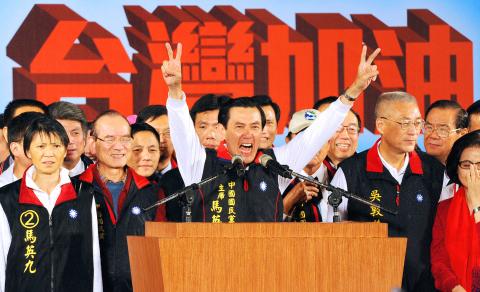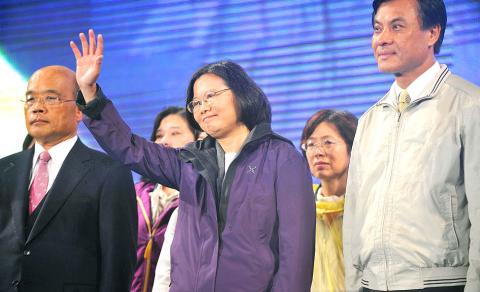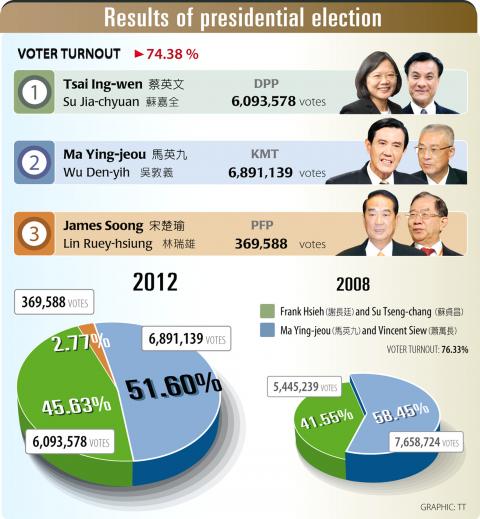President Ma Ying-jeou (馬英九) yesterday secured a second four-year term in office, ending the Democratic Progressive Party’s (DPP) hope for a return to power.
Ma won re-election with more than 6.8 million votes, leading his DPP challenger, Tsai Ing-wen (蔡英文) — who garnered more than 6 million votes — by about 800,000 votes.
According to the figures released by the Central Election Commission (CEC) after the vote counting process was completed shortly before 10pm, Ma received 6,891,139 votes, or 51.6 percent of the total votes; Tsai won 6,093,578 votes, or 45.63 percent of the total; while the People First Party’s James Soong (宋楚瑜) took 369,588 votes, or 2.77 percent of the total votes cast.

Photo: Toshifumi Kitamura, AFP
The voter turnout was 74.38 percent, with 13,452,016 of the 18,086,455 qualified voters casting their votes, CEC figures showed.
Central Election Commission Chairwoman Chang Po-ya (張博雅) announced the numbers immediately after the vote-counting process was completed at a press conference at the Vote Counting and Information Center in Taipei.
“The figures will be finalized at a CEC meeting on Jan. 19,” Chang said. “After the commission confirms the numbers, we will publish the official results.”

Photo: Patrick Lin, AFP
Although Ma won, the total number of votes he received dropped by more than 767,000, from 7,658,724 in 2008, when he received 58.45 percent of the total vote.
On the other hand, votes for the DPP’s presidential candidate increased by 648,000 from 5,445,239 votes in 2008, a growth of 4.05 percent.
Speaking before thousands of jubilant supporters at his national campaign headquarters in Taipei, Ma said his cross-strait policies had resonated with voters.

GRAPHIC: TT
“They gave us support for our policy to put aside differences with the mainland [China], to search for peace and turn it into business opportunities,” he said.
“This is not Ma Ying-jeou’s personal victory, but one for the Taiwanese people. It’s also a victory for our direction toward a clean government, prosperity and peace,” he said.
“I want to thank everyone for your support that has given me the opportunity to achieve the changes Taiwan needs in another four years [in office]. I will never let you down,” he added.
Ma’s re-election is set to be seen in Beijing as a big victory for Chinese President Hu Jintao (胡錦濤), who has moved away from China’s previous policy of repeatedly threatening Taiwan with war and instead has tried to woo Taiwanese by showing the economic benefits of closer ties.
There was no immediate reaction from Beijing on the election results.
Tsai conceded defeat at a press conference in New Taipei City (新北市) soon after Ma spoke to his supporters.
Tsai congratulated Ma on his victory and offered to resign immediately as DPP chairperson, saying that she took full responsibility for the loss.
“It was never easy to challenge an incumbent president. We didn’t do well enough in central and northern Taiwan. I am sorry that I have let our supporters down,” Tsai said.
“I know everyone is sad about the result. It’s OK to cry,” she added. “It is OK to feel depressed and disappointed, but don’t be frustrated and don’t give up. We still need to fight for Taiwan with optimism.”
Tsai urged Ma to listen to the people’s voice in his second term and despite his victory, she still thinks that a domestic consensus is essential before engaging in any further negotiations with Beijing.
She expressed her gratitude to her supporters, saying that their determination for reform should be carried on and that the DPP would be back in the future.
This was the second time Soong has run for president, following his initial bid in 2000, when he received 4,664,932 votes — 36.8 percent of the total votes at the time — and was the candidate with the second- highest number of votes.

Taiwan is gearing up to celebrate the New Year at events across the country, headlined by the annual countdown and Taipei 101 fireworks display at midnight. Many of the events are to be livesteamed online. See below for lineups and links: Taipei Taipei’s New Year’s Party 2026 is to begin at 7pm and run until 1am, with the theme “Sailing to the Future.” South Korean girl group KARA is headlining the concert at Taipei City Hall Plaza, with additional performances by Amber An (安心亞), Nick Chou (周湯豪), hip-hop trio Nine One One (玖壹壹), Bii (畢書盡), girl group Genblue (幻藍小熊) and more. The festivities are to

Auckland rang in 2026 with a downtown fireworks display launched from New Zealand’s tallest structure, Sky Tower, making it the first major city to greet the new year at a celebration dampened by rain, while crowds in Taipei braved the elements to watch Taipei 101’s display. South Pacific countries are the first to bid farewell to 2025. Clocks struck midnight in Auckland, with a population of 1.7 million, 18 hours before the famous ball was to drop in New York’s Times Square. The five-minute display involved 3,500 fireworks launched from the 240m Sky Tower. Smaller community events were canceled across New Zealand’s

‘SLICING METHOD’: In the event of a blockade, the China Coast Guard would intercept Taiwanese ships while its navy would seek to deter foreign intervention China’s military drills around Taiwan this week signaled potential strategies to cut the nation off from energy supplies and foreign military assistance, a US think tank report said. The Chinese People’s Liberation Army (PLA) conducted what it called “Justice Mission 2025” exercises from Monday to Tuesday in five maritime zones and airspace around Taiwan, calling them a warning to “Taiwanese independence” forces. In a report released on Wednesday, the Institute for the Study of War said the exercises effectively simulated blocking shipping routes to major port cities, including Kaohsiung, Keelung and Hualien. Taiwan would be highly vulnerable under such a blockade, because it

UNDER WAY: The contract for advanced sensor systems would be fulfilled in Florida, and is expected to be completed by June 2031, the Pentagon said Lockheed Martin has been given a contract involving foreign military sales to Taiwan to meet what Washington calls “an urgent operational need” of Taiwan’s air force, the Pentagon said on Wednesday. The contract has a ceiling value of US$328.5 million, with US$157.3 million in foreign military sales funds obligated at the time of award, the Pentagon said in a statement. “This contract provides for the procurement and delivery of 55 Infrared Search and Track Legion Enhanced Sensor Pods, processors, pod containers and processor containers required to meet the urgent operational need of the Taiwan air force,” it said. The contract’s work would be